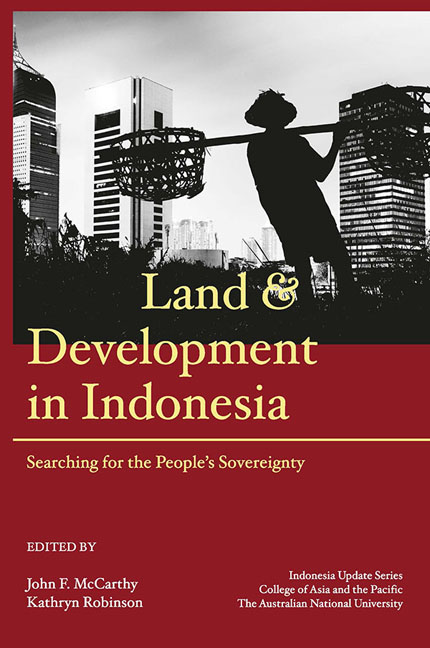Book contents
- Frontmatter
- Contents
- Tables
- Figures
- Contributors
- Acknowledgements
- Glossary
- Map
- 1 Land, economic development, social justice and environmental management in Indonesia: the search for the people's sovereignty
- PART 1 LAND USE AND LAND LAW: THE BIG PICTURE
- PART 2 ENVIRONMENTAL AND CUSTOMARY FRAMING OF LAND TENURE
- PART 3 URBAN AND INFRASTRUCTURE DEVELOPMENT
- PART 4 AGRICULTURE, LAND TENURE AND LIVELIHOODS
- 10 After 200 years, why is Indonesia's cadastral system still incomplete?
- 11 Agrarian transformations and land reform in Indonesia
- 12 Land tenure and agrarian structure in regions of small-scale food production
- PART 5 LARGE-SCALE LAND ACQUISITIONS AND SMALLHOLDER DEVELOPMENT
- Index
- Miscellaneous Endmatter
11 - Agrarian transformations and land reform in Indonesia
from PART 4 - AGRICULTURE, LAND TENURE AND LIVELIHOODS
Published online by Cambridge University Press: 29 July 2017
- Frontmatter
- Contents
- Tables
- Figures
- Contributors
- Acknowledgements
- Glossary
- Map
- 1 Land, economic development, social justice and environmental management in Indonesia: the search for the people's sovereignty
- PART 1 LAND USE AND LAND LAW: THE BIG PICTURE
- PART 2 ENVIRONMENTAL AND CUSTOMARY FRAMING OF LAND TENURE
- PART 3 URBAN AND INFRASTRUCTURE DEVELOPMENT
- PART 4 AGRICULTURE, LAND TENURE AND LIVELIHOODS
- 10 After 200 years, why is Indonesia's cadastral system still incomplete?
- 11 Agrarian transformations and land reform in Indonesia
- 12 Land tenure and agrarian structure in regions of small-scale food production
- PART 5 LARGE-SCALE LAND ACQUISITIONS AND SMALLHOLDER DEVELOPMENT
- Index
- Miscellaneous Endmatter
Summary
The total number of Indonesian households involved in farming to support at least part of their livelihoods is substantial, and poverty rates have persistently been higher in rural than in urban areas. As a result, improved access to agricultural land is widely held to be essential to achieve poverty alleviation. Farm fragmentation is also believed to be widespread, contributing to ever-decreasing farm sizes that lock near-landless, marginal farm households (petani gurem) into a vicious poverty trap. This is the standard narrative supporting the necessity for a broad-ranging land reform program to ensure improved access to agricultural land for petani gurem and landless farmers. This chapter assesses the relationship between the land reform movement and contemporary agrarian transformations in Indonesia—that is, the changing role of agriculture and land in livelihood strategies. In light of these transformations, I examine the discursive, political and structural challenges affecting the capacity of President Joko Widodo's land reform program to support rural poverty alleviation in Indonesia.
The terms ‘land reform’ and ‘agrarian reform’ are sometimes used interchangeably, but there are differences between them. Land reform refers specifically to a change in the social institutions surrounding land ownership or access. Lipton (2009: 1) presents land reform as ‘laws with the main goal of reducing poverty by substantially increasing the proportion of farmland controlled by the poor, and thereby their income, power or status’. Agrarian reform refers to a much broader ‘multi-disciplined set of interrelated aims and means capable of combating the ills of the [unequal] agrarian structure’ (Cohen 1978: 1). The means of achieving agrarian reform usually encompass some kind of redistributive land reform in addition to interventions such as improved agricultural extension, credit availability, trade policies, pricing, and tenancy and wage regulations. In Indonesia (somewhat confusingly), the terms ‘agrarian renewal’ (pembaruan agraria) and ‘agrarian reform’ (reforma agraria) are in fact closely associated with land reform, and are widely used to suggest a progressive land agenda. Pembaruan agraria is legally defined (in MPR Decree IX/MPR/2001) as ‘a sustained process of restructuring the control, ownership and exploitation of agrarian resources, undertaken to attain justice, prosperity, legal protection and certainty for all Indonesian people’.
Opportunities for the active participation of a resurgent peasant-based agrarian movement have emerged in post-authoritarian Indonesia.
- Type
- Chapter
- Information
- Land and Development in IndonesiaSearching for the People's Sovereignty, pp. 245 - 264Publisher: ISEAS–Yusof Ishak InstitutePrint publication year: 2016

